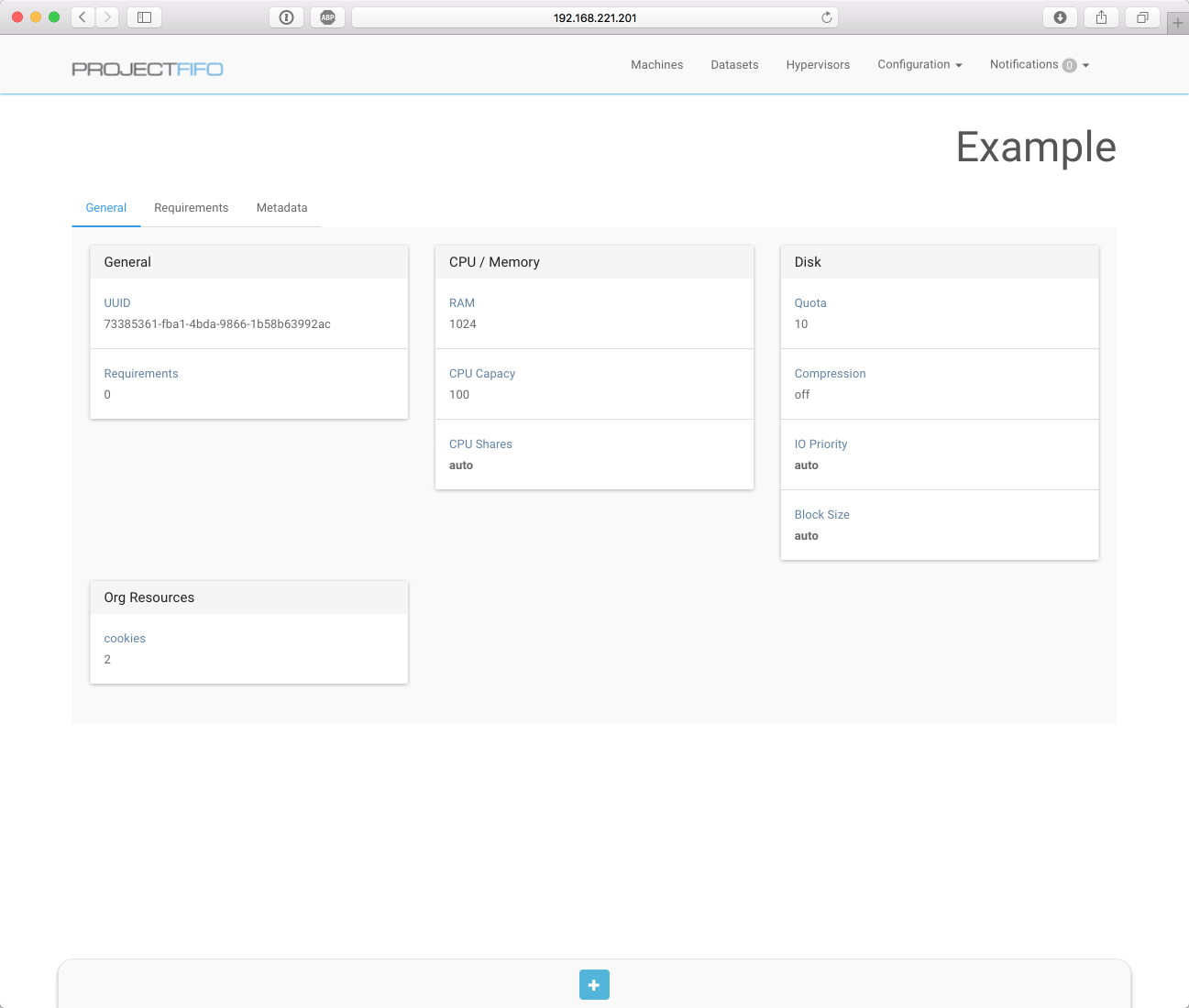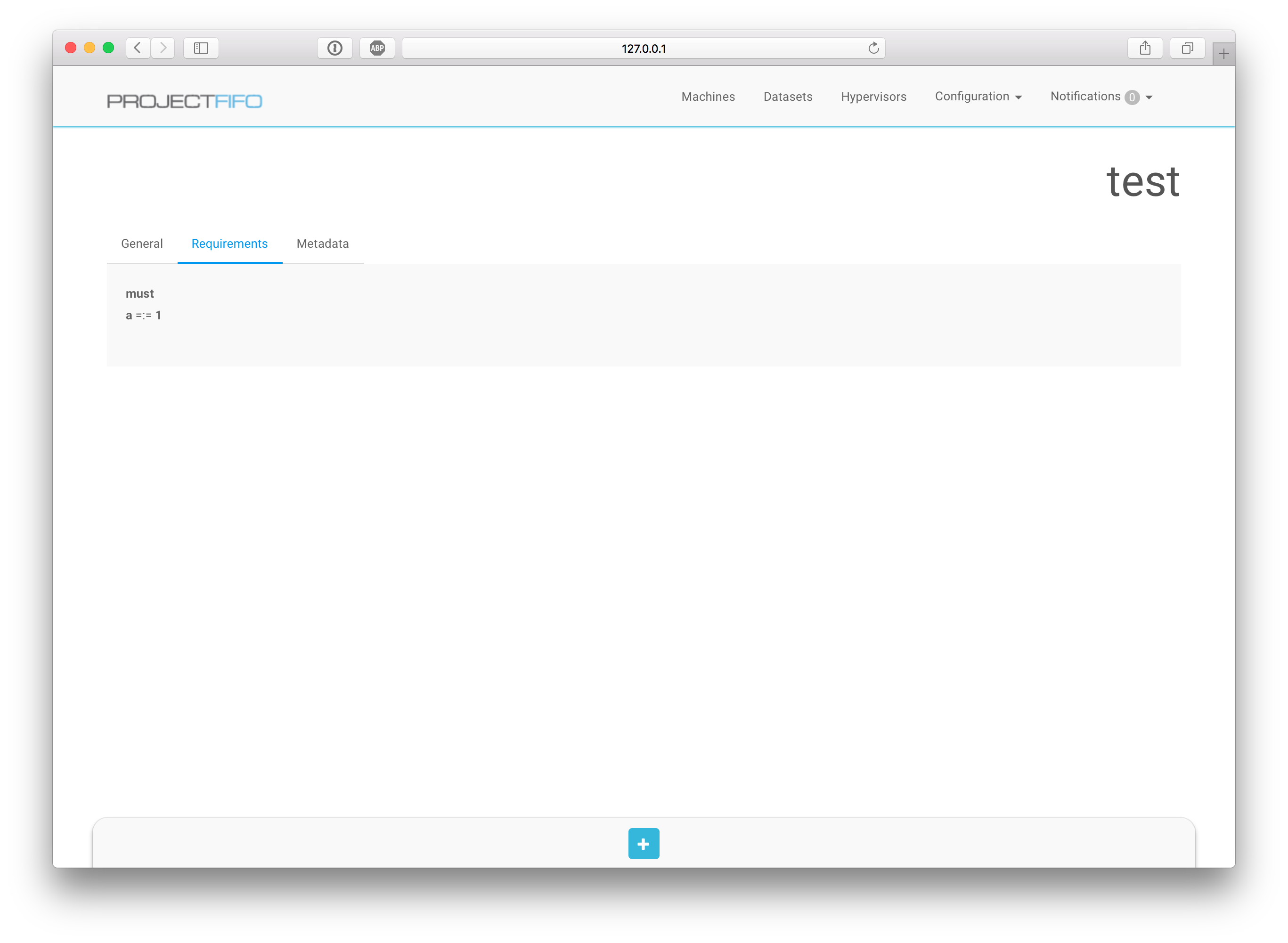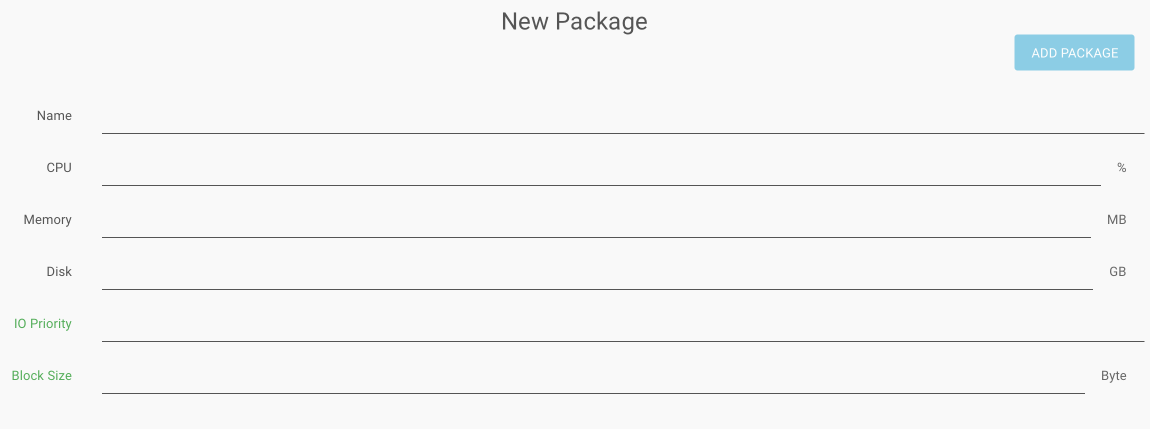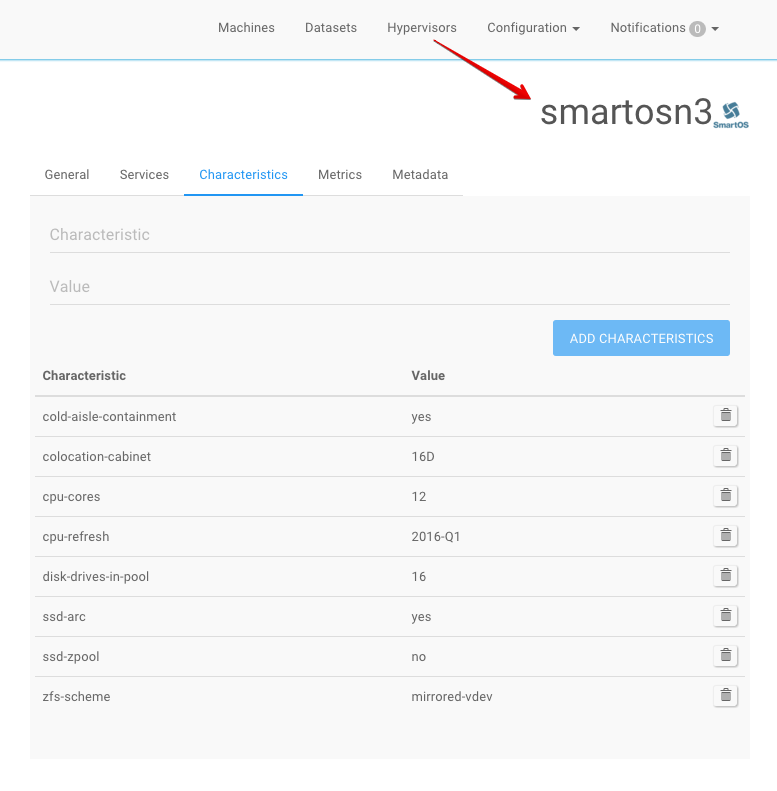Packages
This section explains the detail view for packages
General

The General tab shows the basic information of a package and the provided resources. You can also see the org resources this package claims.
Requirements

The Requirements tab shows all additional requirements a package enforces.
Creation

This lets you create a new package the attributes are the following:
- Name: name of the package
- CPU: percentage of a core, (100% means 1 core)
- Memory: memory in megabyte, for KVM's 1024MB will be added during creation time.
- Disk: Disk quota, for KVM's the dataset's size will be added as this is provided as a secondary disk for KVM's (usually this is 10GB)
- IO Priroty (optional): this will be auto-computed based on memory shares (between 0 and 1024), but can be overwritten.
- Block Size (optional): For KVM the block size of the zvol provided to it.

- Compression (optional): Compression of the ZFS dataset/volume (won't affect existing data).\
- Rules (optional): Additional rules that can be set for the package.

- Org resources: That are claimed from the Org upon creating.
Rules
Rules can access all of the hypervisors information by passing the path to it as a JSON path, an example of the hypervisor object is provided at the end of this section.
{
"alias": "dev01",
"characteristics": {
"cold-aisle-containment": "yes",
"cpu-cores": 6,
"colocation-cabinet": "16D",
"disk-drives-in-pool": 10
},
"etherstubs": [],
"host": "192.168.221.101",
"last_seen": 1454961452,
"metadata": {},
"networks": ["admin", "external", "fifo"],
"path": [{
"cost": 1,
"name": "0d9aa97d-806b-4e1e-b4dc-c4f9502004d3"
}],
"pools": {
"zones": {
"dedup": 100,
"free": 2241547,
"health": "ONLINE",
"size": 2273280,
"used": 31733
}
},
"port": 4200,
"resources": {
"free-memory": 24541.0,
"l1hits": 234074094,
"l1miss": 11119753,
"l1size": 3095,
"l2hits": 0,
"l2miss": 0,
"l2size": 0,
"provisioned-memory": 40960,
"reserved-memory": 0.0,
"total-memory": 65501
},
"services": {
"lrc:/etc/rc2_d/S20sysetup": "legacy_run"
},
"sysinfo": {
"Boot Parameters": {
"module_name_0": "etc/system",
"smartos": "true"
},
"Boot Time": "1454619930",
"CPU Physical Cores": 2,
"CPU Total Cores": 16,
"CPU Type": "Intel(R) Xeon(R) CPU E5-2687W 0 @ 3.10GHz",
"CPU Virtualization": "vmx",
"Disks": {
"c0t50011731001DF1ACd0": {
"Size in GB": 480
}
},
"HW Family": "To be filled by O.E.M.",
"HW Version": "0123456789",
"Hostname": "dev01",
"Link Aggregations": {},
"Live Image": "20160204T080230Z",
"Manufacturer": "Supermicro",
"MiB of Memory": "65501",
"Network Interfaces": {
"ixgbe0": {
"Link Status": "up",
"MAC Address": "00:07:43:13:e3:90",
"NIC Names": ["external", "fifo"],
"ip4addr": ""
},
"igb0": {
"Link Status": "up",
"MAC Address": "00:25:90:78:7c:d8",
"NIC Names": ["admin"],
"ip4addr": "192.168.241.101"
},
"igb1": {
"Link Status": "down",
"MAC Address": "00:25:90:78:7c:d9",
"NIC Names": [],
"ip4addr": ""
}
},
"Product": "X9DRT",
"SDC Version": "7.0",
"SKU Number": "To be filled by O.E.M.",
"Serial Number": "0123456789",
"Setup": "false",
"System Type": "SunOS",
"UUID": "00000000-0000-0000-0000-002590787cd8",
"VM Capable": true,
"Virtual Network Interfaces": {
"external0": {
"Host Interface": "cxgbe0",
"Link Status": "up",
"MAC Address": "02:08:20:71:b4:44",
"VLAN": "0",
"ip4addr": "192.168.201.101"
},
"fifo0": {
"Host Interface": "cxgbe0",
"Link Status": "up",
"MAC Address": "02:08:20:8b:02:ab",
"VLAN": "0",
"ip4addr": "192.168.221.101"
}
},
"Zpool": "zones",
"Zpool Creation": 1438105335,
"Zpool Disks": "c0t50011731001DF1ACd0",
"Zpool Profile": "mirror",
"Zpool Size in GiB": 2150
},
"uuid": "0d9aa97d-806b-4e1e-b4dc-c4f9502004d3",
"version": "dev-b9976f9, Fri Feb 5 16:57:47 2016 -0500",
"virtualisation": ["zone", "kvm"]
}
Package Rules
When defining new packages you have the option to define specific package rules. These rules are very powerful and can be used in conjunction with hypervisor characteristics to dictate fine grained provisioning logic at zone creation time.
A simple example of a basic package rule, would be to deploy a machine on a specific hypervisor at provisioning time.

Sample package rule seen under the package's "requirement" tab
This rule was simply associated with the package when it was added. As shown below:

The above "simplistic" example shows the general workflow with associating provisioning rules with a package.
For more advanced rule combinations, hypervisor characteristics can be used in conjunction with package rules to facilitate complex package provisioning scenarios.

Looking at the above characteristics, one could use a combination of the hypervisor characteristics in conjunction with package rules at machine provisioning time. e.g. only deploy if the hypervisor satisfies these requirements:
characteristics.cold-aisle-containment =:= yes
characteristics.cpu-cores =< 6
characteristics.colocation-cabinet =:= 16D
characteristics.disk-drives-in-pool > 10
Package Rule Parameters
WEIGHT
must | The hypervisor MUST satisfy this requirement or be discarded |
cant | The hypervisor CAN’T satisfy this requirement or be discarded |
| N (integer) | If this rule matches the weight of this hypervisor is adjusted with N (0 is the base value for all hypervisors) |
CONDITION
>= | The value of the hypervisor must be greater or equal then the comparison value |
> | The value of the hypervisor must be greater then the comparison value |
=< | The value of the hypervisor must be lower or equal then the comparison value |
< | The value of the hypervisor must be lower then the comparison value |
=:= | The value of the hypervisor must be equal to the comparison value |
=/= | The value of the hypervisor can’t be equal to the comparison value |
subset | The the comparison value must be a subset of the hypervisor value |
superset | The the comparison value must be a superset of the hypervisor value |
disjoint | The the comparison value must be a disjoint with the hypervisor value |
element | The the comparison value must be an element of the hypervisor value |
ATTRIBUTE
An attribute is any JSON path as string - This describes how the hypervisor value will be found (i.e. “resources.free-memory”). A value is integer, string, array - the value that will be tested against.
USABLE ATTRIBUTES
resources.free-memory | amount of free memory available |
resources.total-memory | total memory on the node |
resources.provisioned-memory | node memory allocated for both running and stopped vm’s |
resources.free | free disk storage available on the pool in MB e.g. 11871 |
resources.size | the size of the zpool in MB e.g. 20352 |
resources.used | used disk space on the pool in MB e.g. 8481 |
pools.*.free | free size in pool zones e.g. 8481 |
health | the status of the zpool e.g. ONLINE |
networks | name of the network tag e.g. admin |
uuid | uuid of the hypervisor |
alias | hypervisor name, e.g. 00-0c-29-18-ec-10 or compute-node-2 |
virtualisation | node virtualisation type capability e.g. zone or kvm |
Updated less than a minute ago
